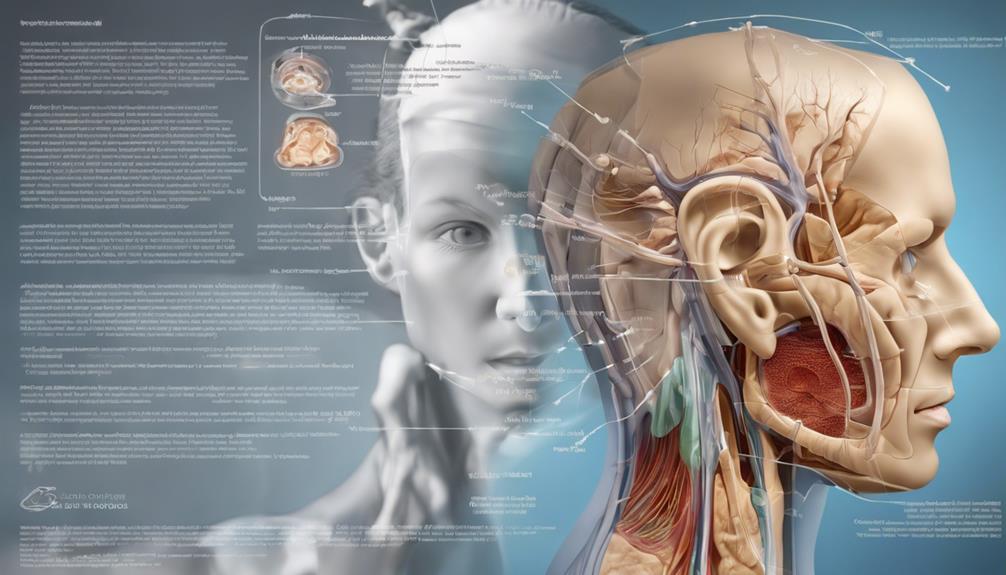In this guide, we will explore the intricate connection between allergies and hearing loss. Have you ever wondered how seasonal allergies could impact your ability to hear clearly?
The connection may surprise you. Let's explore the hidden complexities behind this link and uncover practical strategies to navigate these challenges effectively.
Key Takeaways
- Allergies obstruct the Eustachian tube, leading to hearing loss.
- Excess mucus from allergies can cause ear infections and inflammation.
- Allergies impact ear pressure regulation, affecting sound transmission.
- Timely treatment for allergy-induced hearing issues is crucial for ear health preservation.
Allergies and Hearing Loss Mechanisms
Allergies can directly impact hearing by causing excess mucus production that may lead to obstructions in the Eustachian tube, potentially resulting in hearing loss. When allergic reactions trigger the production of excess mucus in the ear, it can create a conducive environment for bacteria to thrive, leading to infections and inflammation within the inner ear. This inflammation can obstruct the Eustachian tube, which is responsible for equalizing pressure in the ear, causing discomfort and potential hearing impairment.
Furthermore, allergies can contribute to conductive hearing loss, where sound waves are unable to travel freely through the ear canal due to blockages or fluid build-up. This interference with sound conduction can result in a decreased ability to perceive sounds clearly. Understanding how allergies impact the ear and hearing mechanisms is essential for managing allergy symptoms that could potentially lead to temporary hearing issues.
Symptoms of Allergy-Related Hearing Issues

When experiencing allergy-related hearing issues, recognizing symptoms such as itching in the ear can indicate underlying problems that may require attention. Allergic reactions can trigger an excess production of mucus in the middle ear, leading to discomfort and potential hearing loss. Ear discharge, often associated with allergies, may signal ear disease and shouldn't be ignored. It's crucial to refrain from using objects to scratch the ears, as this can exacerbate allergy-related symptoms and potentially cause further damage.
Fluid leakage from the ear is another common sign of ear problems related to allergies. Allergies can also make individuals more susceptible to middle ear infections, which can result in discomfort and impact hearing ability. When the immune system responds to allergens, it can lead to inflammation in the outer or middle ear, affecting the transmission of sound and causing disruptions in auditory function. Being vigilant about these symptoms can help in early detection and management of allergy-related hearing issues.
Impact of Allergies on Ear Health
Experiencing the impact of allergies on ear health can lead to various complications, including reduced hearing ability and increased susceptibility to infections. Allergies can trigger allergic reactions that affect the outer ear and ear canal, leading to issues such as excess fluid accumulation and inflammation. Sound reactions can cause swelling in the ear, interfering with your ability to hear properly.
When allergic reactions occur, they can result in inflammation or blockages in the middle ear, potentially causing ear infections and compromising hearing. In some cases, allergies may lead to middle ear infections, impacting the mobility of the tympanic membrane and further contributing to hearing loss.
People experiencing allergy-related hearing problems, such as fullness in the ear, conductive hearing loss, or tinnitus, should schedule an appointment with a healthcare professional promptly to address these issues before they worsen. Allergies and hearing are intricately connected, making it crucial to manage allergies effectively to preserve ear health and hearing function.
Treatment Options for Allergy-Induced Hearing Loss

To effectively address allergy-induced hearing loss, considering various treatment options is crucial for managing symptoms and improving overall ear health. Hearing loss is curable, and treatment may involve using antihistamines to reduce inflammation and fluid buildup in the ear. Decongestants can help alleviate ear pressure caused by allergies, ultimately improving hearing function.
In more severe cases where inflammation and discomfort persist, corticosteroids may be prescribed for targeted relief. Seeking professional help from an ENT specialist is essential for accurate diagnosis and personalized treatment of allergy-related hearing issues. Depending on the severity and chronicity of the condition, allergy shots or immunotherapy might be recommended to effectively manage symptoms and prevent recurrence.
These treatment options aim to not only address the immediate effects of allergies on hearing but also work towards long-term management and prevention strategies to promote optimal ear health.
Importance of Timely Intervention for Hearing Health
Addressing allergy-induced hearing loss promptly is crucial to prevent permanent damage and improve overall hearing outcomes. When it comes to our experience with allergies affecting hearing, timely intervention plays a significant role. Here's why:
- Early Identification: Getting a hearing test at the first signs of allergies can help pinpoint any issues before they escalate.
- Preventing Complications: Skin reactions can cause discomfort and potentially lead to more severe complications if not managed promptly.
- Quality of Life: People with allergies, such as hay fever, may experience a decrease in their quality of life due to hearing issues. Timely intervention can help maintain a better quality of life.
- Faster Recovery: Prompt management of ringing or high-pitched sounds in the ears can lead to faster recovery, allowing individuals to get back to their daily activities sooner.
Seeking professional help early on and avoiding reliance on unproven home remedies are crucial steps in managing allergy-induced hearing loss effectively. Regular monitoring and intervention can also help preserve optimal hearing function over time.
Frequently Asked Questions
How Do Allergies Cause Hearing Loss?
Allergies cause hearing loss by triggering excess mucus production that can block the Eustachian tube, leading to pressure in the ear. Inflammation or blockages in the middle ear from allergies can result in ear infections and reduced hearing ability.
Allergic rhinitis, like hay fever, can also cause inflammation and excess fluid that impairs hearing. Middle ear infections can be a consequence of allergic reactions, affecting tympanic membrane mobility.
Are Allergies the 6th Leading Cause of Chronic Illness in the Us?
Yes, allergies are the 6th leading cause of chronic illness in the US. They impact around 50 million Americans, leading to various symptoms affecting daily life.
The economic burden includes healthcare costs and productivity losses. Managing allergies effectively is crucial to minimize their impact on chronic illness rates.
What Are the 3 Stages of an Allergic Reaction?
When we talk about an allergic reaction, we usually refer to three stages: sensitization, activation, and effector.
Sensitization involves the immune system identifying an allergen as a threat.
Activation triggers the release of antibodies like IgE in response to the allergen.
The effector stage then leads to the release of histamine and other chemicals, causing allergy symptoms.
Understanding these stages can greatly assist in managing and treating allergic reactions effectively.
What Are the 7 Allergy Symptoms?
When it comes to allergy symptoms, we can experience a range of issues affecting different parts of our body. Sneezing, itching, congestion, watery eyes, skin reactions like hives or rashes, and respiratory troubles like coughing and wheezing are common.
Digestive problems such as nausea and diarrhea can also occur. Additionally, fatigue, headaches, and irritability might indicate an allergic response. It's crucial to recognize and address these symptoms promptly.
Conclusion
Just as a gentle breeze can clear away the clouds to reveal the bright sun, seeking professional help for allergy-induced hearing loss can bring clarity and relief to your auditory world.
Let Dr. Julie Prutsman at Sound Relief Tinnitus & Hearing Center guide you through the storm of symptoms with personalized care and effective solutions.
Don't let allergies overshadow your ability to hear the beautiful symphony of life – take action and reclaim your sound.










